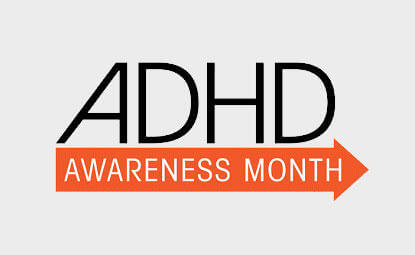ADHD Awareness Month – October
October is Attention Deficit Hyperactivity Disorder (ADHD) Awareness Month. ADHD is a behavioural disorder which is characterised by inattentiveness, hyperactivity and impulsiveness. It often presents in children from an early age but becomes more apparent at around school age due to the changes that happen at this time. Often, children are diagnosed between the ages of 6 and 12 but this diagnosis can occur later in life.
It has been found that symptoms can diminish as the child grows into adulthood but it can cause other more persistent problems such as sleep difficulties and anxiety disorders. Symptoms can differ depending on the age of the person affected. In adults, symptoms tend to be expressed in mood swings, extreme impatience, irritability and an inability to focus. In children, the initial symptoms tend to be shown through having a short attention span, making careless mistakes, appearing forgetful and constantly fidgeting. It is common for children with ADHD to also experience other conditions related to the disorder such as depression, autism spectrum disorder and epilepsy, however this is not always the case. In adults the conditions that are often seen in conjunction with ADHD differ slightly, and include, personality disorders, bipolar disorder and obsessive compulsive disorder (OCD), as well as the most common condition, depression.
Finding one particular cause for ADHD has not been possible yet but there are indications to links with children being born prematurely and smoking and alcohol misuse during pregnancy. It has been suggested that ADHD is genetic as it is seen to run in families, where a parent or sibling of someone with ADHD runs a higher risk of also having it themselves. However, it has not been found to be related to one single genetic fault and is far more complex than that.
Treatment for ADHD tends to begin with medication and then therapy often follows to help deal with the more behavioural symptoms. The medication is often prescribed to help someone with the condition to feel calmer, concentrate better and be less impulsive. This medication is not always prescribed to be taken daily and for some children it works more effectively if only taken on school days.
Therapy is another way in which ADHD can be treated. This tends to work especially well alongside medication, especially for those having more behavioural problems. Cognitive Behavioural Therapy has been found to be particularly useful in the treatment of ADHD because it helps the person understand how they are feeling about a situation and how their behaviour can change to change that feeling.
At The Eaves, we have a range of counsellors, cognitive behavioural therapists and psychologists who are specially trained in treating both children and adults with ADHD. If you would like to contact any of our therapists regarding treatment of ADHD, please use the search function at the top of the page.
References
https://www.nhs.uk/conditions/attention-deficit-hyperactivity-disorder-adhd/

